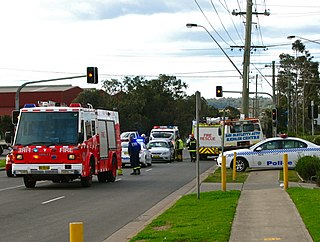
Emergency services and rescue services are organizations that ensure public safety, security, and health by addressing and resolving different emergencies. Some of these agencies exist solely for addressing certain types of emergencies, while others deal with ad hoc emergencies as part of their normal responsibilities. Many of these agencies engage in community awareness and prevention programs to help the public avoid, detect, and report emergencies effectively. Emergency services are often considered first responders, and typically have dedicated emergency vehicles.

An emergency is an urgent, unexpected, and usually dangerous situation that poses an immediate risk to health, life, property, or environment and requires immediate action. Most emergencies require urgent intervention to prevent a worsening of the situation, although in some situations, mitigation may not be possible and agencies may only be able to offer palliative care for the aftermath.

The International Rescue Committee (IRC) is a global humanitarian aid, relief, and development nongovernmental organization. Founded in 1933 as the International Relief Association, at the request of Albert Einstein, and changing its name in 1942 after amalgamating with the similar Emergency Rescue Committee, the IRC provides emergency aid and long-term assistance to refugees and those displaced by war, persecution, or natural disaster. The IRC is currently working in about 40 countries and 26 U.S. cities where it resettles refugees and helps them become self-sufficient. It focuses mainly on health, education, economic wellbeing, power, and safety.
The Disaster Assistance Response Team (DART) (French: Équipe d'intervention en cas de catastrophe (EICC)) is a rapidly deployable team of 200 Canadian Forces personnel. It provides assistance to disaster-affected regions for up to 40 days. DART's headquarters is located in Kingston, Ontario. DART was created by the Canadian government in 1996 in the aftermath of the inadequate response to the 1994 Rwandan genocide, when Canada's aid arrived after the peak of a cholera epidemic. The government determined that it would be of the utmost importance in many disasters if it was able to rapidly deploy a group of people until long-term aid arrived. DART has an annual budget of CA$500,000, although during specific incidents the Parliament of Canada can choose to temporarily allocate millions of dollars to DART to fund their response effort. For example, Operation Torrent, the aid mission to Turkey in the wake of the 1999 earthquake which left 17,000 people dead, saw CA$15 million used by DART in the response.

Emergency management or disaster management is a science and a system charged with creating the framework within which communities reduce vulnerability to hazards and cope with disasters. Emergency management, despite its name, does not actually focus on the management of emergencies, which can be understood as minor events with limited impacts and are managed through the day-to-day functions of a community. Instead, emergency management focuses on the management of disasters, which are events that produce more impacts than a community can handle on its own. The management of disasters tends to require some combination of activity from individuals and households, organizations, local, and/or higher levels of government. Although many different terminologies exist globally, the activities of emergency management can be generally categorized into preparedness, response, mitigation, and recovery, although other terms such as disaster risk reduction and prevention are also common. The outcome of emergency management is to prevent disasters and where this is not possible, to reduce their harmful impacts.

Disaster response refers to the actions taken directly before, during or in the immediate aftermath of a disaster. The objective is to save lives, ensure health and safety and to meet the subsistence needs of the people affected. This includes warning/evacuation, search and rescue, providing immediate assistance, assessing damage, continuing assistance and the immediate restoration or construction of infrastructure. The aim of emergency response is to provide immediate assistance to maintain life, improve health and support the morale of the affected population. Such assistance may range from providing specific but limited aid, such as assisting refugees with transport, temporary shelter, and food to establishing semi-permanent settlements in camps and other locations. It also may involve initial repairs to damage or diversion to infrastructure.
Many countries and international organizations offered the United States relief aid in the wake of Hurricane Katrina.

The international response to the 2005 Kashmir earthquake was widespread and immediate, as many countries, international organizations and non-governmental organizations offered an abundance of relief aid to the affected regions − particularly Pakistan, which was hit the hardest due to the earthquake's epicentre being around Muzaffarabad, the capital city of Pakistani-administered Azad Jammu and Kashmir. The aid given was in the form of monetary donations and pledges, as well as relief supplies including food, various medical supplies, tents and blankets. Rescue and relief workers as well as peacekeeping troops were sent from different parts of the world to the region, bringing along rescue equipment, including helicopters and rescue dogs. The earthquake displaced some 3.3 million people, while killing around 80,000–100,000.

The Turkish Red Crescent is the Turkish affiliate of the International Red Crescent and the first worldwide adopter of the crescent symbol for humanitarian aid.
Citizen Corps is a program under the Department of Homeland Security that provides training for the population of the United States to assist in the recovery after a disaster or terrorist attack. Each local Citizen Corps Council partners with organizations, volunteers and businesses to organize responders, volunteers and professional first responders for an efficient response so efforts are not wasted by being duplicated. By training in Incident Command, volunteers know whom to report to and how the incident is organized. This prevents sites from being inundated by untrained and unprepared personnel preventing operation. Citizen Corps also works in conjunction with the Corporation for National and Community Service in promoting national service opportunities for promoting homeland security needs.
An incident response team (IRT) or emergency response team (ERT) is a group of people who prepare for and respond to an emergency, such as a natural disaster or an interruption of business operations. Incident response teams are common in public service organizations as well as in other organizations, either military or specialty. This team is generally composed of specific members designated before an incident occurs, although under certain circumstances the team may be an ad hoc group of willing volunteers.
Americares is a global non-profit organization focused on health and development that responds to individuals affected by poverty, disaster, or crisis. The organization addresses poverty, disasters, or crises with medicine, medical supplies and health programs.

The Finnish Red Cross is an independent member of the International Federation of Red Cross and Red Crescent Societies, which is one of the biggest and best-known international organisations in the world and in the field of humanitarian aid. FRC has over 71,000 members and around 30,000 active volunteers in Finland. FRC consists of 12 regional chapters and 433 local branches throughout the country. The current General Secretary is Eero Rämö. At the end of 2022, the FRC employed 787 people, of which 204 worked at the headquarters in Helsinki.

Johanniter-Unfall-Hilfe e.V., commonly referred to as Die Johanniter, is a voluntary humanitarian organisation affiliated with the Brandenburg Bailiwick of the Order of St John, the German Protestant descendant of the Knights Hospitaller. The organisation was founded in 1952 in Hanover under the leadership of Rudolf Christoph Freiherr von Gersdorff. One of the main reasons for its creation was the rise in injuries and deaths from road traffic accidents. JUH participates in international aid efforts together with its sister organisations in other countries as part of the Johanniter International partnership; it also works with the German Malteser Hilfsdienst, affiliated to the Catholic Sovereign Military Order of Malta. As of 2017 the organisation had 37,000 active volunteers and youth members and around 1,300,000 registered members.
In Ukraine, emergency medical services are provided by the Ukrainian Emergency Medical Services (UEMS), a special type of government rescue service, the main task of which is to provide free of charge medical assistance to victims, rescuers and any other persons who take part in the response to and/or recovery process after incidents of any kind.
IsraAID is an Israel-based non-governmental organization that responds to emergencies all over the world with targeted humanitarian help. This includes disaster relief, from search and rescue to rebuilding communities and schools, to providing aid packages, medical assistance, and post-psychotrauma care. IsraAID has also been involved in an increasing number of international development projects with focuses on agriculture, medicine, and mental health.
Many countries around the world have civil defense organizations dedicated to protecting civilians from military attacks and providing rescue services after widespread disasters. In most countries, civil defense is a government-managed and often volunteer-staffed organization.
Israeli foreign aid relates to the development assistance and humanitarian aid provided by Israel to foreign countries. Israel provides assistance to developing countries to alleviate and solve economic and social problems through its international cooperation program of technical assistance, based on its own recent and ongoing experience in developing human and material resources. Israel's Agency for International Development Cooperation, established as an agency of the Israeli Foreign Ministry in 1958 and known by its Hebrew acronym, MASHAV, is the primary vehicle for providing this aid.
Emergency medical services (EMS) in Pakistan are provided both by the government and private sector, with the latter being main a payment-for-service system. Healthcare falls under the responsibility of provincial governments, except for in the federally administered territories.
China International Search and Rescue(CISAR) team was a professional heavy search and rescue team responsible for search and rescue during earthquake breakout, which existed from 2001 to 2018 until it was superseded by the China Search and Rescue team formed by the Ministry of Emergency Management.










